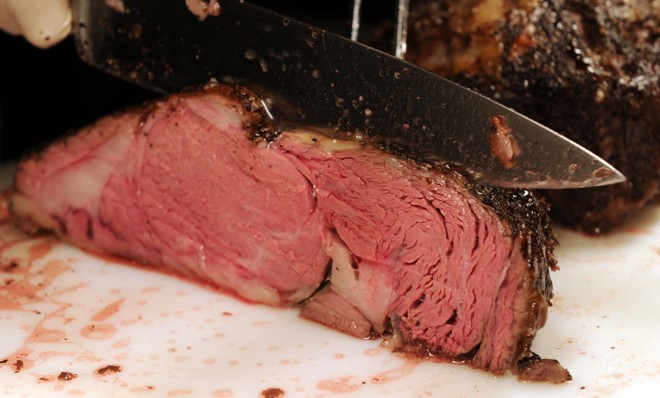Sorry, steak-lovers: Even lean red meat may cause heart disease
A chemical found in beef combined with bacteria in your guts could lead to more plaque in your arteries

A free daily email with the biggest news stories of the day – and the best features from TheWeek.com
You are now subscribed
Your newsletter sign-up was successful
Red meat is delicious. So delicious, in fact, that consuming it every so often may make you a happier person. And while an indulgent steak once in awhile shouldn't harm anyone (other than the cow in question), the high saturated fat content of beef has been linked to a whole host of health woes, including higher blood cholesterol levels and heart disease.
But beef-lovers have always sort of had a way around that: Lean cuts that are low in fat but high in protein should be okay for you, right? Well, not according to a new study published in Nature Medicine, which found a potentially dangerous relationship between a compound found in red meat and the bacteria swimming around naturally in our guts.
The intestinal microbes in question were shown to convert beef's L-carnitine — a chemical also found in energy drinks and supplements — into a blood compound called trimethylamine N-oxide, or TMAO. The compound is typically associated with the build-up of congestive plaque in our arteries. Doctors call this condition atherosclerosis, and it's linked with — surprise — heart attacks.
The Week
Escape your echo chamber. Get the facts behind the news, plus analysis from multiple perspectives.

Sign up for The Week's Free Newsletters
From our morning news briefing to a weekly Good News Newsletter, get the best of The Week delivered directly to your inbox.
From our morning news briefing to a weekly Good News Newsletter, get the best of The Week delivered directly to your inbox.
"Bacteria make a whole slew of molecules from food," says study co-author Stanley Hazen, "and those molecules can have a huge effect on our metabolic process." To test if beef really does increase the level of TMAO in our blood, researchers enlisted dozens of volunteers — mostly "young, hungry students," says Hazen — and did what any good scientist does: They fed their subjects steak.
After consuming the beef, urine and blood tests showed that the volunteers' TMAO levels had indeed risen.
To make sure the culprit really was the gut bacteria outlined in hypotheses, the team had their volunteers take antibiotics to suppress the microbes. A week later, they again fed the participants beef. This time, however, the patient's TMAO levels were undetectable, "suggesting the conversion couldn't happen without bacteria present," says Science Now.
Further tests on mice revealed a similar relationship between L-carnitine levels and TMAO levels. "The finding should give pause not only to meat lovers, but also to people who take L-carnitine supplements, which are marketed with the promise that they promote energy, weight loss, and athletic performance," says Scientific American. Although the results are far from conclusive, this study could pave the way for further research to determine L-carnitine's exact relationship with arterial clogging.
A free daily email with the biggest news stories of the day – and the best features from TheWeek.com
-
 The ‘ravenous’ demand for Cornish minerals
The ‘ravenous’ demand for Cornish mineralsUnder the Radar Growing need for critical minerals to power tech has intensified ‘appetite’ for lithium, which could be a ‘huge boon’ for local economy
-
 Why are election experts taking Trump’s midterm threats seriously?
Why are election experts taking Trump’s midterm threats seriously?IN THE SPOTLIGHT As the president muses about polling place deployments and a centralized electoral system aimed at one-party control, lawmakers are taking this administration at its word
-
 ‘Restaurateurs have become millionaires’
‘Restaurateurs have become millionaires’Instant Opinion Opinion, comment and editorials of the day